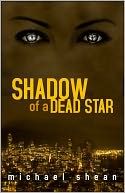 In Michael Shean's futuristic noir, Shadow of a Dead Star, we follow the gut instincts of Thomas Walken, an agent with the Industrial Security Bureau in Seattle, 2078. In a world where technology and commercialism is god, it is up to Walken to keep black-market technology off the Seattle streets. He has no idea that when he's sent to intercept a shipment of smuggled Princess Dolls, which are little girls turned into sex toys, that his entire world, and the world as he knows it will be lost to him forever. When the dolls are stolen out of custody, Walken is put on the spot to find out the who and why behind it and this time it's not just his job on the line, but his life.
In Michael Shean's futuristic noir, Shadow of a Dead Star, we follow the gut instincts of Thomas Walken, an agent with the Industrial Security Bureau in Seattle, 2078. In a world where technology and commercialism is god, it is up to Walken to keep black-market technology off the Seattle streets. He has no idea that when he's sent to intercept a shipment of smuggled Princess Dolls, which are little girls turned into sex toys, that his entire world, and the world as he knows it will be lost to him forever. When the dolls are stolen out of custody, Walken is put on the spot to find out the who and why behind it and this time it's not just his job on the line, but his life.
Shean's writing rips you out of your comfortable chair and hurls you directly into the story. It is one thing for a writer to write a story about a dark and brooding place, it is something entirely different when the reader can actually feel the coldness and the despair emanate from the page. Shadow of a Dead Star captures the spirit, or actually, lack-of spirit that the noir genre is so popular for. Walken hates the world as it has become; a world where most people have more hardware in them then actual organs. He has no implants, or upgrades to help him to do his job, yet he relies on his gut instincts, instincts that have proven to be very useful in the past. He's a loner, again a must for the noir genre, someone who does his job because it's his job and moves on.
One of the questions Shean tackles within this novel that I absolutely loved is that of humanity and what makes us human. In Walken's future people can hook themselves up to computers for a plethora of reasons from receiving and sending data to performing sexual acts amongst others. When people talk about the Princess Dolls its done with a sense of disconnect and apathy. These dolls were once human girls who were abducted and turned into robots and because of that last part, that is how society sees them, as robots. Everyone, that is, except for Walken. When he finds the smuggled shipment of dolls he sees three little girls and his stomach turns.
To further the debate, Shean introduces Bobbi January to the story. She fully takes advantage of technology and the advancements in place to help alter your body and mind. She also views the dolls as just that, a doll engineered for whatever the buyer wants; to her they are no longer human. But the question then becomes, what makes someone human? Bobbi can hook herself to any mainframe and collect and scatter data, she, in a sense, becomes a computer.
However, even though she is as enhanced as one can get without actually turning into a robot, Bobbi, oddly enough, is Walken's voice of reason. She becomes his truth in a world made up of illusions. Walken has become so jaded by life and all that he has seen that this new way of life can only mean bad things. Bobbi tries to open him up, to make him see the world for what it is; she challenges him to stop feeling sorry for himself and to realize that the path he was on was not going to give him the answers he was looking for.
Shean's twisted tale blends technology, depravity and greed with the popular elements of science fiction and noir together into a seamless plot with few slow spots and plenty of action. His writing is fluid and the story had just enough complexity to keep you reading to find out the answers but not too much that you'd be left scratching your head.